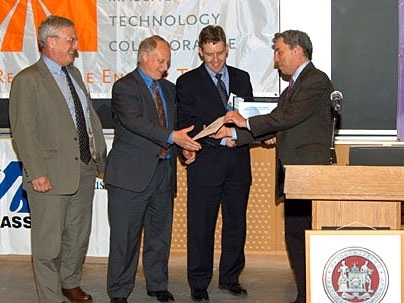Energy entrepreneurs in solar power, hydro power and waste processing convinced a panel of industry leaders and venture capitalist judges that their businesses can make clean energy competitive with conventional energy -- earning prizes in the 2006 Ignite Clean Energy Business Presentation Competition on Tuesday, May 9.
Started in 2005 by the Energy Special Interest Group of the MIT Enterprise Forum, the Ignite competition provides training, mentoring and coaching, plus $125,000 in prizes and services to clean-energy entrepreneurs, with the goal of building a thriving clean-energy industry in Massachusetts.��
Ten start-up companies made it to the finals out of a field of almost 40. The winning team, Stellaris, expects to build a company in Lowell, Mass., to capture its share of the growing $11 billion in annual worldwide solar energy panel sales.
Stellaris addresses the high cost of solar energy systems by decreasing the solar module size by 40 percent while increasing the efficiency of its energy generation by more than 20 percent. The Stellaris PowerTile captures and concentrates indirect light via a translucent panel that can be used in conventional windows, patio tiles and skylights.
Stellaris' chief operating officer, Lee Johnson, presented the team's plan to the judges and an overflow audience of nearly 400 at the Stata Center.
The Stellaris team won $15,000 cash, plus $25,000 in office/incubator space and $7,500 in legal services. The award was presented by Warren Leon, director of the Massachusetts Technology Center's Renewable Energy Trust, platinum sponsor of the competition.
The competition focuses on presentation skills. "Investors are a tough audience," said visiting scholar Linda Plano, the competition chair. "So it's critically important that an entrepreneur be able to catch an investor's imagination and hold it for 10 minutes by getting them excited by the opportunity and confident of the team's ability to execute."
While the finalists' 10-minute presentations were the highlight of the evening, the crowd also took advantage of networking opportunities while viewing 30 exhibits presented by finalists, semi-finalists and sponsors.
Two second-place teams each took home a $5,000 cash award, $25,000 in office/incubator space and $5,000 in legal services: Solasta (the Eagle Axis), a Boston College faculty team developing ultra-high-efficiency solar cells using nanoscale elements; and Feed Resource Recovery, a Babson College student team whose company uses food and other organic wastes to produce biomethane and a highly effective organic fertilizer.
Synergetic Power Systems, one of two MIT student teams in the finals, took third prize with its parabolic concentrating solar collector systems business. The team includes Amy Mueller, Matthew Orosz, Sorin Grama, Ignacio Aquirre, Perry Hung, Elizabeth Wayman and mentor Mark Wolf.
Robert Lifton, CEO of Medis Technologies, provided the keynote address, offering advice from his experience growing Medis from a startup to a business valued at more than $800 million.
A version of this article appeared in MIT Tech Talk on May 17, 2006 (download PDF).






